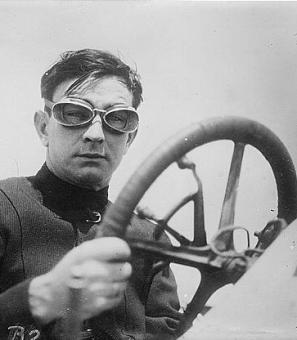Jimmy Carter's Play Days: 39th President Was a Mainstay in DC's Theater Scene
Although Jimmy Carter may have come from humble peanut-farming roots in Plains, Georgia, the 39th president’s appetite for the arts was anything but provincial. A slew of popular musicians helped propel him to the White House,1 and once he was Washington, he wasted no time becoming a mainstay of the D.C. theater scene. In fact, despite serving only a single term in Washington, Carter holds the record among sitting presidents for attending shows at the Kennedy Center — 28 in his four years in the District.2
Ford's Theatre (Source: Carter Presidential Library)
His first visit to the center came on a whim one Sunday shortly after his inauguration in 1977. On the way back from church service, the Carters decided to catch the matinee of Madama Butterfly. Telegraphing their plans to nobody besides the Secret Service agents with them, Jimmy and Rosalynn Carter made their way to the presidential box with their daughter Amy, their pastor, and a few other friends in tow. Despite their attempts at a low-key entrance, the new president was met with a standing ovation upon his arrival. It wasn’t long before the White House press corps rushed to the Kennedy Center and descended upon the first family.3
At the show’s conclusion, Carter went backstage to greet the cast, as he would do at the close of nearly any performance he attended. This was perhaps one of his favorite of the privileges awarded to him by his new position. As he told Thomas Bogar, author of American Presidents Attend the Theatre, “I am usually overwhelmed with a great performance, and consider it an honor to meet the artists.”4
performance in Hello Dolly! Later that night he caught
her... less costumed than she is above.
(Source: AP)
He was perhaps at times a bit too eager to meet the cast, however. To celebrate the First Daughter’s eleventh birthday, the Carters took her to a production of Hello Dolly! at the National Theater. The trio then went backstage where the whole of the cast sang “Happy Birthday” to Amy. Then the president entered the dressing Room to congratulate lead actress Carol Channing only to find her wearing tights which “revealed both cheeks of her derriere.”5 Apparently the actress didn’t mind, later quipping that “when you’re exposed to the President of the United States and he doesn’t care, that’s democracy.”6
These meet and greets weren’t limited solely to the changing rooms of the stars, however. In January 1978, Carter invited some 500 guests to the East Room of the White House to commemorate the 10th anniversary of the reopening of Ford’s Theatre. The hefty guest list included several of the era’s biggest names in performance, such as Henry Fonda, Vincent Price, and Eartha Kitt. Before the crowd, Carter celebrated the woman behind the Ford Theatre’s revival, Frankie Hewitt, who created a non-profit allowing live productions to continue at the theatre.7 He thanked her for bringing a piece of culture back to the city, “not as a museum, a closed and dead thing… but as an open and alive thing,” further stating that “it wasn’t in the character of Lincoln to have a source of entertainment, tragedy, and humor kept... from the people of our nation.”8, 9
In another example of honoring the accomplishments of his nation’s theatrical citizenry, he was the first president to attend a show by Eugene O’Neill, the first American to receive the Nobel Prize for Literature. During this production of Anna Christie, one of the actors seemed to have injected a quip about peanuts into one of the lines.
“Would you have Anna lying down at night with a muddy scut, stinking of pigs and peanuts and dung?”
Hechter Ubarry (right) after their performance of
Man of La Mancha at the National Theater in 1977.
(Source: U.S. National Archives)
When Carter went backstage, he told the actor that he had reread the play before attending and never encountered any lines about peanuts, to which the actor confessed that their director had inserted it for the occasion.10
If the part of that anecdote that sticks out to you is not the peanut joke, but the fact that Carter read the entire script beforehand, you may be surprised to learn that “studying” before a performance was a rather common practice for the Georgian. A voracious reader all his life, Carter actually took speedreading classes at the White House so he could read the 300 pages of documents the job required of him on a daily basis.11 This talent certainly aided in his artistic consumption as well, he told Bogar that he often read scripts of plays and listened to numerous recordings of operas, saying that when they come together,
“It’s like meeting an old friend when I hear a live performance. There’s a similar transformation from the written screenplay to the stage.”12
When an auditorium might clear out during an intermission, Carter often remained seated, dutifully reading the evening’s playbill cover to cover. This deep and thorough way of understanding was an approach to art he held long before joining politics. Back when they lived in Georgia, a friend who owned a radio station gifted the Carters a stack of opera records because nobody wanted to hear them on air. According to Rosalyn, Jimmy “promptly went out and bought a book on opera to learn even more [about it].”13
These elements he so admired, the transportive power of soundtracks, the passion of performers, the dedication of playwrights, the historical context of plots, the beguiling culture of the entire theatre, all culminated in 2014 when Carter found himself immortalized upon the stage.
Perhaps Carter’s greatest and most lasting achievement as president were the 13 days he spent at Camp David in 1978, meeting with Egyptian president Anwar Sadat and Israeli prime minister Menachem Begin. Through grueling negotiations, the three crafted the Camp David Accords, a framework which later led to a historic peace treaty between Egypt and Israel.14 Many may look at that nearly two-week summit and imagine endless conversations of policy minutia and wearisome diplomatic dinners, but Carter’s communications director, Gerald Rafshoon, thought otherwise.
“I always said it was a story about when an Orthodox Jew, a Muslim and a born-again Christian, three men of faith, went behind closed doors — it sounds like a joke — and came back in 13 days with the only peace treaty that has stood the test of time in the Middle East.”15
In addition to his political career, Rafshoon has worked extensively as a television producer, and he saw the events of Camp David as a gripping and tense political drama waiting to be told. He long thought it would play best as a film, but after the success of Frost/Nixon, a play chronicling the tense series of televised interviews between President Richard Nixon and journalist David Frost, Rafshoon turned his attention to the theatre.16
In 2011, he teamed up with journalist and playwright Lawrence Wright and Arena Stage director Molly Smith to concoct the production. In order to accurately depict the national and individual perspectives of the characters, Rafshoon and Wright went on a world tour conducting interviews. First the pair went south to Plains, Georgia to speak to the Carters, where both the former president and the First Lady lent the team their personal diaries.17 Then the two went international, visiting Cairo, Tel Aviv, and Jerusalem to interview the surviving members of President Sadat and Prime Minister Begin’s delegations.18
After three years, the play was complete, and on April 3, 2014, the curtain opened for the world premiere of Camp David at Arena Stage’s Kreeger Theater. The production consisted only of four actors, representing US President Jimmy Carter, First Lady Rosalyn Carter, Egyptian President Anwar Sadat, and Israeli Prime Minister Menachem Begin. The guests of honor, Jimmy and Rosalynn Carter, had the profound experience of sitting in the audience while they watched versions of themselves from 36 years earlier onstage. They weren’t the only distinguished audience members that night. Joining the couple was Jehan Sadat, widow to the Egyptian president, the ambassadors from Egypt and Israel, and several of Carter’s former aides.19
As the theatre darkened, the four actors took the stage to relive those 13 days which Carter claimed were “among the most dramatic of [his] life.”20 The performance included key moments from the actual talks, such as when the leaders, seemingly hitting a brick wall in negotiations, took a field trip to the battlefield of Gettysburg. There, Prime Minister Begin begins to recite Abraham Lincoln's historic Gettysburg address. The emotional conclusion comes when Carter gives Begin an envelope full of signed photos of the three leaders, each copy addressing by name one of Begin's eight grandchildren. Though dramatized to an extent, the play closey followed the events of the summit.
The performance was well received by critics, and the former president observed the impact that it had not just on himself, but all in attendance.
“It was amazingly good. I couldn’t believe how good it was. The audience just was enraptured… A third or half of them had tears running down their cheeks. It was a really emotional experience.”21
(left) and Richard Thomas (right), who portrayed
them in the 2014 "Camp David" play.
(Source: Bisnow)
Though this was far from the typical performance the presidential couple had attended in the past, they ended it like they did so many others: a personal visit with the actors, this time for all to see. As the cast bowed and the audience rose to their feet in celebration, the Carters joined the actors on stage and embraced them. One critic wrote that “Rosalynn grasping the arm of [Hallie Foote, the actress who portrayed her] and fixing a firm, loving gaze on her past self—only deepened the through the looking glass experience.”22
As we look back at the life of Jimmy Carter, we remember his presidential achievements, such as the Camp David Accords and the creation of the Department of Education, as well as his humanitarian contributions after his presidency, like his Habitat for Humanity work and the founding of the Carter Center, which earned him a Nobel Peace Prize in 2002. Throughout his career of service to the country and to the world, let us not forget that he always found time to appreciate the beauty in the world, and honored those artists who help create it.
Special thanks to Thomas Bogar, whose book American Presidents Attend the Theatre greatly informed this story.
Footnotes
- 1 "When Music Makes History," WETA, https://weta.org/watch/shows/when-music-makes-history/ramblin-man.
- 2 Bogar, Thomas A. American Presidents Attend the Theatre: The Playgoing Experiences of Each Chief Executive. (North Carolina: McFarland & Company, Inc., Publishers, 2006), 332.
- 3 Bogar, Thomas A. American Presidents Attend the Theatre: The Playgoing Experiences of Each Chief Executive. (North Carolina: McFarland & Company, Inc., Publishers, 2006), 332.
- 4 Bogar, 331.
- 5 Bogar, 336.
- 6 Rosenfeld, Megan, "Movies," The Washington Post, January 29, 1986. https://www.washingtonpost.com/archive/lifestyle/1986/01/29/movies/bb7bd92d-66ad-4b7a-9c58-24dfde5f9fab/.
- 7 Jones, Kenneth, "Frankie Hewitt, Who Preserved Ford's Theatre for Plays, Remembered at DC Memorial April 28," Playbill, April 17, 2003. https://playbill.com/article/frankie-hewitt-who-preserved-fords-theatre-for-plays-remembered-at-dc-memorial-april-28-com-112688.
- 8 Bachrach, Judy and Jaqueline Trescott, "Lights! Action! Lassos! and Ruffled Feathers at Ford's Theatre," The Washington Post, January 31, 1978. https://www.washingtonpost.com/archive/lifestyle/1978/01/31/lights-action-lassos-and-ruffled-feathers-at-fords-theatre/9f92f10b-92f1-424c-aa1b-7fc064d967b9/.
- 9 Carter, Jimmy, "10th Anniversary of Ford's Theatre Remarks at a White House Reception," The American Presidency Project, January 29, 1978. https://www.presidency.ucsb.edu/documents/10th-anniversary-fords-theatre-remarks-white-house-reception.
- 10 Bogar, 333.
- 11 speedreading101, "Jimmy Carter on Speed Reading 101," YouTube video, November 30, 2012. https://www.youtube.com/watch?v=wjnN4GcQxiU.
- 12 Bogar, 331.
- 13 Bogar, 332.
- 14 Office of the Historian, "Camp David Accords and the Arab-Israeli Peace Process," United States Department of State. https://history.state.gov/milestones/1977-1980/camp-david#:~:text=The%20Camp%20David%20Accords%2C%20signed,and%20Egypt%20in%20March%201979.
- 15 Stolberg, Sheryl Gay, "Carters Return to Capital, Onstage," The New York Times, April 2, 2014. https://www.nytimes.com/2014/04/03/us/camp-david-at-arena-stage-relives-78-peace-talks.html.
- 16 Marks, Peter "Arena's 'Camp David' Tries to Turn the Grind of Diplomacy into the Stuff of Drama," The Washington Post, March 14, 2014. https://www.washingtonpost.com/entertainment/theater_dance/arenas-camp-david-tries-to-turn-the-grind-of-diplomacy-into-the-stuff-of-drama/2014/03/13/10d8d572-a9fe-11e3-8a7b-c1c684e2671f_story.html?tid=a_inl_manual.
- 17 Wright, Lawrence, "Thirteen Days in September: Carter, Begin and Sadat at Camp David," (New York: Alfred A. Knopf, 2014), 292.
- 18 Wright, 291.
- 19 Stolberg, Sheryl Gay, "Carters Return to Capital, Onstage," The New York Times, April 2, 2014. https://www.nytimes.com/2014/04/03/us/camp-david-at-arena-stage-relives-78-peace-talks.html.
- 20 McCalmont, Lucy and Patrick Gavin, "Carter Raves over Camp David Play," Politco, April 3, 2014. https://www.politico.com/story/2014/04/jimmy-carter-camp-david-arena-stage-washington-dc-105373.
- 21 McCalmont, Lucy and Patrick Gavin, "Carter Raves over Camp David Play," Politco, April 3, 2014. https://www.politico.com/story/2014/04/jimmy-carter-camp-david-arena-stage-washington-dc-105373.
- 22 Blancahrd, Jayne, "Camp David," DC Theatre Scene, April 7, 2014. https://dctheatrescene.com/2014/04/07/camp-david/.


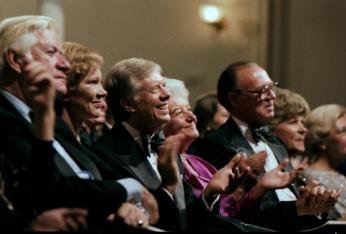
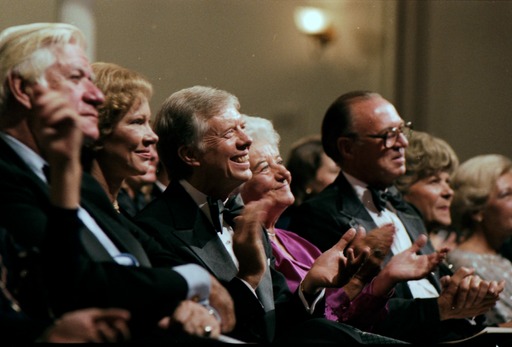
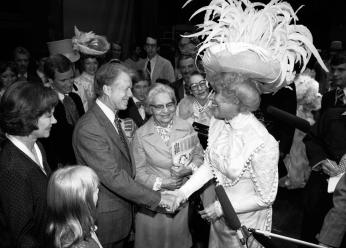
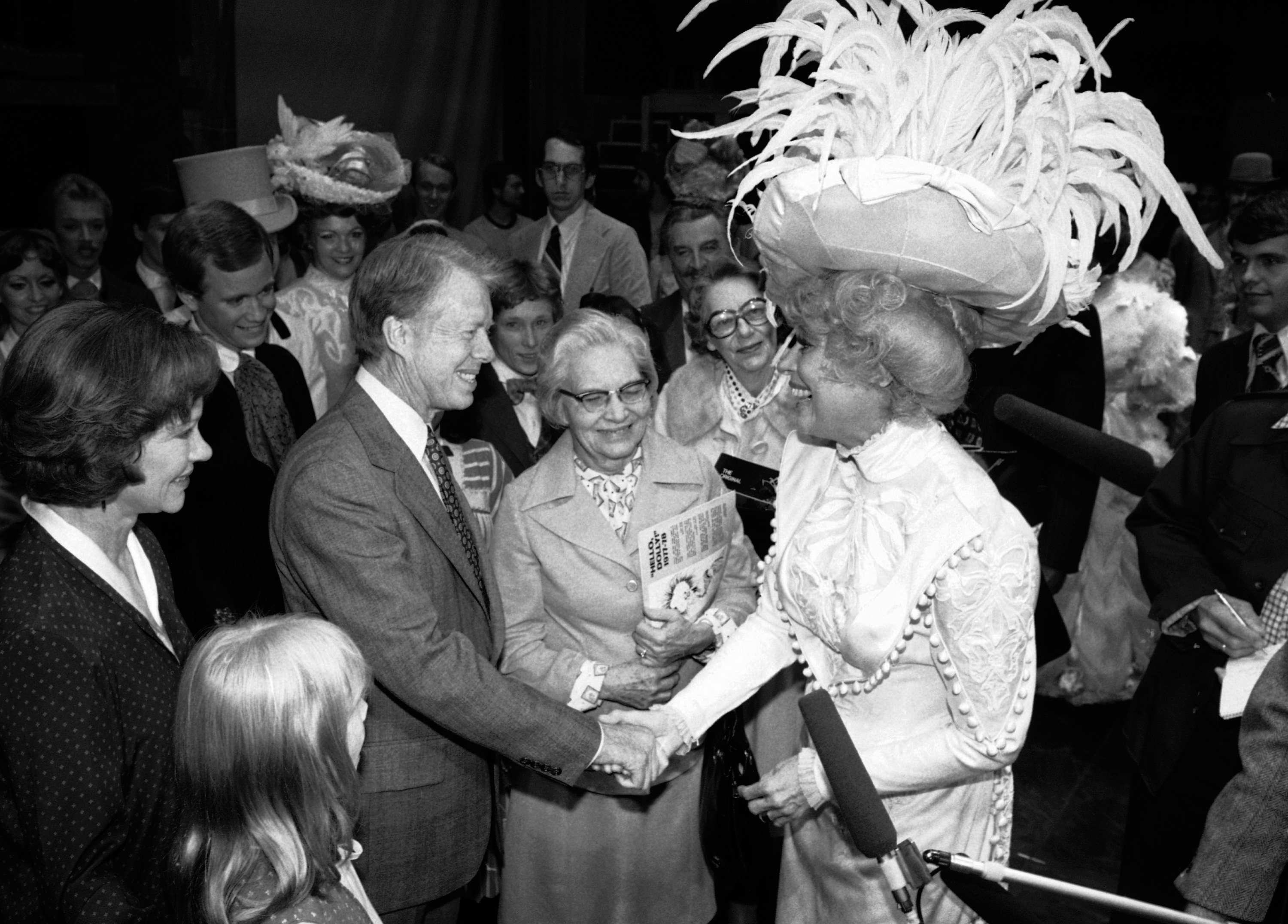

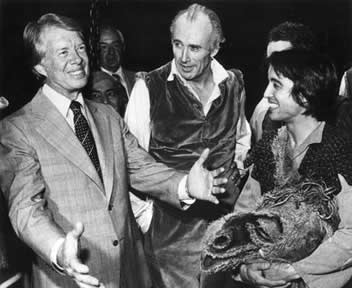
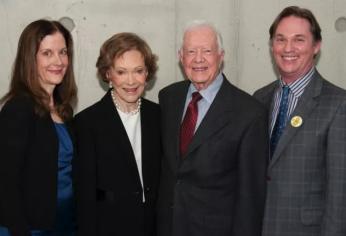
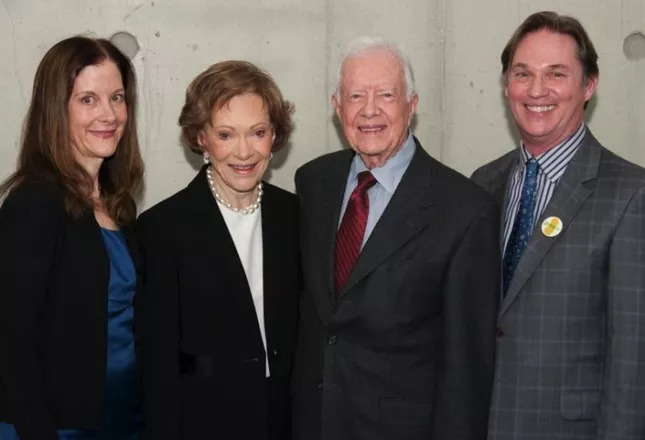
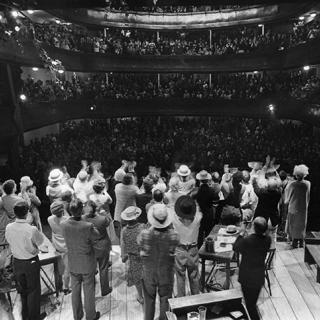
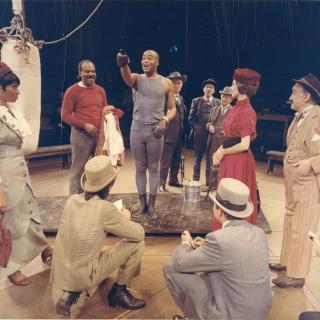
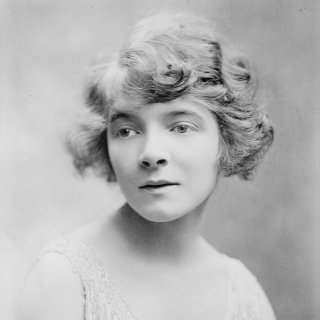
![Sketch of the mythical fuan by Pearson Scott Foresman. [Source: Wikipedia]](/sites/default/files/styles/crop_320x320/public/2023-10/Goatman_Wikipedia_Faun_2_%28PSF%29.png?h=64a074ff&itok=C9Qh-PE1)











